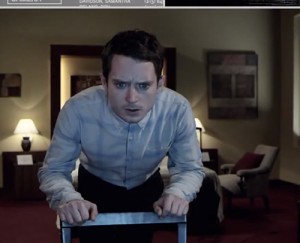Open Windows: Too much of a smart gimmick
1 out of 4 stars
Filmgoers rarely get a completely new and exciting way to show a story on film. So much of filmmaking and storytelling has sat squarely on the shoulders of the causality of the plot that many filmmakers have become afraid to stray outside of the simplicity of character and storyline. With cyber thriller Open Windows, Writer/director Nacho Vigalando introduces us to a bold, exciting new filmmaking device that will make your head spin in anticipation of the next trick he has up his sleeve.

Unfortunately, the other aspects of the film do not come up to snuff; the script and structure seem to suffer from overbearing attention to detail and overstuffed plot, whereas the actors could have used much more direction.
Nick Chambers (Elijah Wood) runs a fan website for action star Jill Goddard (Sasha Grey). He has been invited down to Austin for a one-on-one interview with her at a press event for her latest movie. While Nick watches her at the event from his laptop, a mysterious man named Chord (Neil Maskell) contacts him and informs him that there has been a mistake and Jill will not be able to do the interview. Slowly however, things begin to turn strange: as Chord begins to provide Nick with access to Jill’s phone camera, surveillance cameras around her, and more, Nick begins to discover that Chord is a sociopathic hacker with ulterior motives involving Jill.
Nick has only his laptop to help him, as well as a secret hacker group known as the Triops, led by a man known only as Pierre (Adam Quintero). And now he is in a race against time to save Jill from whatever mischief Chord has up his sleeve.
 This summary gives you maybe a tenth of the storyline. Suffice it to say, there is a lot of plot here and not a lot of structure. Writer/director Vigalando, known mostly for his work on shorts, has stretched a very neat story past its limits into a 100 minute movie that does not seem to know where it wants to go. He gives a good half a dozen blindsiding reveals that lose their shock value after each previous plot point, mainly because they ask far too much for our plausibility to handle.
This summary gives you maybe a tenth of the storyline. Suffice it to say, there is a lot of plot here and not a lot of structure. Writer/director Vigalando, known mostly for his work on shorts, has stretched a very neat story past its limits into a 100 minute movie that does not seem to know where it wants to go. He gives a good half a dozen blindsiding reveals that lose their shock value after each previous plot point, mainly because they ask far too much for our plausibility to handle.
These stretches in logic become particularly problematic when they start to unwittingly create sharp shifts in tone and style, as if five different movies were pasted together into one. The opening sequence, for example, shows much humor and wit. The following sequences lose this entirely, mostly relying on thriller tropes to get by. And if you can swallow the final reveal of the movie, more power to you. But it is so out of left field, your brain might snap.
The big take away from this movie: the ingenious storytelling device of the computer. Vigalando has shot this entire movie as if we are watching a laptop screen, with different windows open on the desktop that give us multiple views of the action. This is groundbreaking stuff and, truth be told, the gimmick never gets boring. If anything, it keeps us wondering what Vigalando will throw at us next, whether it be a hacked camera, a new window a character cannot see, or a zany (REALLY zany) concept involving ping pong cameras in a trunk. Unfortunately Vigalando does not achieve much outside of this device, as his fifty plot developments eventually wear on us and his direction of actors never really sparks interest.
Wood does fairly well here. His take on the terror and shock of the situation feels believable, but whenever he attempts confidence or calm, he occasionally forces these traits. Grey feels very at home with the calculating, cunning girl and plays this well. She too has a few forced moments, particularly in the low-key moments that start the film, but gets into the character once the thriller ball really gets rolling.

Maskell’s role mostly relies on his voice, of which he has solid control. He feels slightly out of a different film, however, as his fake voices when he talks to characters other than Nick feel more Saturday morning cartoon and less thriller. And Quintero holds his own, even considering the unnecessary and confusing French accent with which he’s been saddled.
Despite what never really ascends past a B-movie plot, Open Windows has enough new ideas and fascinating tricks to keep things interesting. For a while. Eventually the insanity of the plot and the mediocre acting wears on its audience and leaves it ready for the end. Vigalando definitely shows his skill as a short filmmaker; this feels like a concept for a short. And honestly, maybe that short would have had much more promise. Simplicity is nothing to shake a stick at.
For another take on Open Windows, check out Jon Gallo’s review.

Mark McCarver was born and raised in Houston, Texas and has been involved in theater and film since he was a kid. He spent the past few years acting and directing across Texas before moving to Washington, DC in the fall of 2012 to get a taste of the East Coast’s entertainment industry. Mark holds a BA in Drama from Trinity University and trained at the Syracuse University – London Drama Program and Shakespeare’s Globe. He is a company member with Half Mad Theatre in Washington.
